Introduction
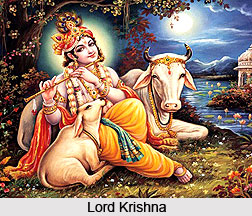 Lord Krishna is the "Avatar" of Lord Vishnu whose influence on human lives far exceeds that of any other God incarnate. Krishna is also depicted as Govinda, who is the principal cause of all causes, the embodiment of wisdom and selfless action as well as a human liberal and practical philosopher with foresight.
Lord Krishna is the "Avatar" of Lord Vishnu whose influence on human lives far exceeds that of any other God incarnate. Krishna is also depicted as Govinda, who is the principal cause of all causes, the embodiment of wisdom and selfless action as well as a human liberal and practical philosopher with foresight.
The Krishna avatar put a lot of impression in the human mind and he got wide popularity. He had an almost universal appeal. The super-human deeds of Krishna revealed a striking human capacity for drinking, fighting and romantic adventures. Most of his works of valour can be found in the Mahabharata, the great Indian epic. The courageous activities of Krishna can be seen mainly in its later interpolation, the Bhagavad-Gita which is almost entirely devoted to him.
Etymology of Lord Krishna
Krishna is a Sanskrit term whose literal meaning is black or dark and describes someone with a very dark skin. The Gaudiya tradition explains the primary meaning of the name Krishna is "all-attractive". According to Adi Sankara"s, Krishna is the 57th name of Vishnu and means the "Existence of knowledge and Bliss".
Birth of Lord Krishna
The birth of Lord Krishna signified a great event in Indian mythology. This avatara of Lord Vishnu brought an end to the notorious activities of his own maternal uncle, the King of Mathura - Kansa.
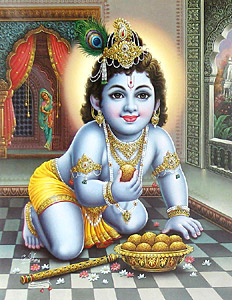 Vasudev, a descendent of Yadu and hailing from the Lunar Dynasty, married Rohini, the daughter of King Rohan and later again married the sister of King Kansa - Devaki. On the very moment of their marriage, a heavenly voice declared the future of this nuptial bond, saying that the eighth child of Vasudev and Devaki will be the reason of King Kansa`s death. Kansa was furious on hearing this and decided to slay down the groom of his only sister. However, somehow controlled, King Kansa went forward to slay each of the six sons born to Vasudev and Devaki. The couple was held in impenetrable prison within his kingdom.
Vasudev, a descendent of Yadu and hailing from the Lunar Dynasty, married Rohini, the daughter of King Rohan and later again married the sister of King Kansa - Devaki. On the very moment of their marriage, a heavenly voice declared the future of this nuptial bond, saying that the eighth child of Vasudev and Devaki will be the reason of King Kansa`s death. Kansa was furious on hearing this and decided to slay down the groom of his only sister. However, somehow controlled, King Kansa went forward to slay each of the six sons born to Vasudev and Devaki. The couple was held in impenetrable prison within his kingdom.
When, Devaki was pregnant for the seventh time, the serpent Shesh or Ananta on whom Narayana rests, took an avartara birth. In order to save his seventh child, Lord Vishnu took up an incarnation and transferred the child from Devaki`s womb to Rohini, who lived in Gokula. She took care of the child and lovingly named him Balarama. Nand and his wife Yasoda living in the same place, were still childless and yearned for one. Lord Vishnu appeared in the dreams of Devaki and narrated her whole incident of her seventh child and later Vasudev told King Kansa that the child was miscarried by Devaki.
Lord Krishna took birth in Devaki`s womb; however during the same time Lord Vishnu destined the pregnancy of Yashoda in Gokula, as if both shall have the child at the same time. When Kansa learnt that his sister was about to deliver another child, he took stern steps of slaying the child immediately he was born. Finally the avatara of Lord Vishnu was born and the realms of earth and heaven were flowing with happiness and prosperity. The forests bloomed with fruits and flowers, rivers flew swiftly and birds were singing sweet songs. The Gods showered flowers on the child and gandharvas played divine instruments.
As Lord Krishna was born, Devaki and Vasudev saw his divine appearance. The cloudy grey, moon faced, lotus eyed, crowned and wearing jeweled robe with four arms holding conch, mace, lotus flower and disc assured his parents that he was no ordinary child. Vasudev and Devaki bowed down to the Lord and He assured them of safety and well-being. He asked his parents to take him to mother Yashoda and bring her daughter to deliver to King Kansa. The image of the Almighty slowly merged into the body of the lying child.
Devaki pleaded Vasudeva to take the child to their friends Nand and Yashoda in Gokula to keep his safe from the plight of her brother. Vasudeva agreed to the proposal and took the divine child in his arms. At that very moment, the guards fell fast asleep; fetters fell from the limbs of the couple and the all the gateways opened stealthily. Vasudev placed his son in a basket, took it on his head and set out for Gokula. He faced the tumultuous Yamuna River and was bewildered seeing its current and force. However, he prayed to Lord Vishnu and entered the water. The level of the water rose more and more, reaching his nose. Lord Krishna saw his distress and stretched out his tiny foot from the basket, as soon as it touched the water, the level of the water sank down.
Vasudeva crossed River Yamuna and reached Nand`s house, and saw the baby girl born to Yashoda. He slowly took the baby girl in his basket and placed Lord Krishna beside Yashoda. On returning to Mathura, into his prison, again the fetters came back into his limbs and the scenario changes as they were before. Suddenly, the baby started to cry loudly and the news of her birth went to King Kansa immediately. When the king heard that the child was a girl, he was much relieved of the terror and started to treat his sister and Vasudev warmly. However, he was enraged against the Gods because he believed that they tried to deceive him and lamented for loosing the chance of killing Vishnu himself.
Lord Krishna grew up with all comforts and love in Gokula, but King Kansa in Mathura could not forget the heavenly prediction and eventually ordered to kill all the devotees of Lord Vishnu. Following his orders, all Brahmans, Yogis, Sanyasis and religious individuals were killed mercilessly all across Mathura and surrounding places.
Childhood of Lord Krishna
The incidents in the childhood of Lord Krishna are all entailed in the great Indian epic Mahabharata. The mischief and miracles by Lord Krishna in his infant days are still revered and remembered by the Indians as the holy antics by the Vishnu avatara in Gokula with the Braj people.
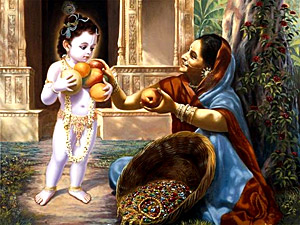 After the birth of Lord Krishna, his father Vasudeva brought him to Gokula. He was brought up in the safe and secured supervision of mother Yashoda and Nand. The maternal uncle of Lord Krishna, King Kansa was destined to die in his hands and thus the king wanted to kill Krishna right from his birth. During his childhood, Krishna faced several perilous situations that were designed by the notorious Kansa, however no one could slay him for his unsurpassed divine power.
After the birth of Lord Krishna, his father Vasudeva brought him to Gokula. He was brought up in the safe and secured supervision of mother Yashoda and Nand. The maternal uncle of Lord Krishna, King Kansa was destined to die in his hands and thus the king wanted to kill Krishna right from his birth. During his childhood, Krishna faced several perilous situations that were designed by the notorious Kansa, however no one could slay him for his unsurpassed divine power.
There were great rejoicings and celebration in Gokula after the Braj people came to know about the charming son of Nand and Yashoda. The astrologers predicted that this divine child would kill the demons and the evil, thus he should be called the Lord of the herds and the Gopis. King Kansa somehow came to know that his reason of death lived in Gokula and kept on sending demons to slay all the children of the place.
A rakhshasi named Putana took up the appearance of a beautiful lady with poison in her breasts, and went to Gokula aiming to kill Krishna. She entered Yashoda`s house and mingled with everyone very gracefully. She took up the baby Krishna in her lap and tried to give him her breast milk that had fatal poison. However, to her astonishment Lord Krishna hold her tight and sucked so hard as to take her life oput along with the poison. The poison had no effect on the Lord, while Putana rakhshasi flew away and fell dead on a far away hard ground with her original huge and distorted appearance. Lord Krishna gave her salvation by drinking her milk.
Soon, another event took place, when Lord Krishna was sitting under a cart playfully and sucking his toe. Another rakshasi saw him and went to sit on the cart with the aim to crush it and kill the baby Krishna. However, the Lord gave a hard blow on the cart and everything fell apart and killed the demoness. When Krishna was only five months old, a ferocious whirlwind came to sweep him away from his mother`s lap. Steadily, the storm became a cyclone, but could not even lift Lord Krishna. Lastly, he allowed the wind to take him up in the air, but came down unharmed after thrashing the demon down to death.
Krishna and his elder brother Balaram were very mischievous and often took away the pots of curds, when the Gopis (girls of Braj) were asleep. Anything hidden on the high shelf could not save it from Krishna, as he climbed on to have the entire curd (makkhan). Every time the Gopis complained about Krishna to his mother calling him butter thief, he made some plausible excuse and pacified his mother.
One day, the infant Krishna was playing with Balaram in the courtyard and ate a handful of clay. When Yashoda came to know that, she was about to beat the child, but Krishna wiped his mouth and denied the fact. Yashoda knew about his son`s mischievious nature and insisted upon to look into his mouth. As he opened his mouth, mother Yashoda saw the entire universe in his mouth. She saw the tree worlds together in his mouth, but could not believe that his son can be the Lord of the three worlds. Lord Vishnu more than once, should mother Yashoda that he was the incarnation of the Almighty. Ultimately, it was always a mother`s love that always understood her child only to be the pampered "kanha".
When Lord Krishna was only 5 years old, King Kansa again threatened him with danger. He went to the woods along with his cattle and friends. A demon in form of a crane, called `Bakasur` was sent by Kansa to kill Krishna. He came by the riverbank and sat there waiting for Krishna and the herd boys. When he tried to attack Krishna, he easily allowed the Bakasur to take him on his long and hard beak. Eventually, Krishna held open the crane`s jaws and tore them apart, thus killing this demon too.
Kans once again sent a dragon named Aghasur to kill Krishna. He hid in the woods of Braj and kept his mouth open alike a mountain cave. When the herd boys came to the woods they thought this huge hole to be the entrance of a cave. Nearing it, the boys could smell the poisonous breadth of the dragon and cried out in distress. Lord Krishna came and entered the cave; the mouth of the dragon was shut. Krishna made himself bigger and bigger until the stomach of the dragon got burst.
Once, Lord Krishna went to the fields along with the other herd boys. Lord Brahma came down to capture all the herd boys and cattle and hid them in a mountain cave. Krishna understood the trick of Lord Krishna and created another group of herd boys and cattle. He took them back and returned to Braj. With the passage of one year`s time, Lord Brahma completely forgot the event. Suddenly one day he remembered and came to Gokula to see the situation. Brahma saw that all the herd boys and cattles were in the likeness of Gods, with four arms and the shape of the Brahma, Rudra and Indra. The creator himself was afflicted like an un-worshipped, un-honored stone image. Lord Brahma fell on Krishna`s feet and apologised, saying that all things are enchanted by Krishna`s illusion and who can even think to bewilder him. Lord Krishna forgave him and restored the real boys and herds.
The childhood frolics of Lord Krishna is loved and adored by the Indians. He is worshipped by the childless in the desire to attain a charming and blessed child like Lord Krishna. The childhood photo of Lord Krishna is said to be a lucky one in every household.
Mountain Lifting by Lord Krishna
Lord Krishna saved the people of Braj from torrents of rain for seven days by holding the Govardhan Parvat on his small finger. Once, due to scarcity of rain, the Braj people prayed ardently to Lord Indra for rain and offered all the necessary offerings to the Lord. However, Krishna came up and persuaded them to give up the worship for Lord Indra and instead pray to the supreme power the Sun God. He also said that Indra is no supreme God. Woods, streams and hills should be worshipped for rains. He especially asked the Braj folk to pray Mount Govardhan, who is sure to bring rain in their land.
Immediately, all the people of Brindavan brought flowers, fruits and other religious offerings for the mountain and started to pray; Nand and Yashoda passionately called Mount Govardhan to wash out the distress of their men. In the meanwhile, Lord Krishna took up another form of the mountain God and gracefully received the offerings of his devotees. However, at the same time, he remained in his same Krishna form and prayed to the mountain along with his mates. The Braj people were greatly content seeing that the fruits offered to the mountain were vanishing one by one; actually Lord Krishna ate them all.
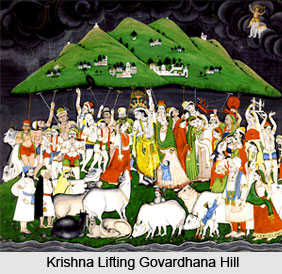 While this worshipping was executed in Brindavan, Lord Indra was enraged at the insult and loss of gifts. He called for the King of Clouds and decreed him to rain over Braj, until the entire land along with the Govardhan Parvat was swept over. An army of clouds covered the sky over Braj and poured torrential rain, as if the end of the world was at hand. Seeing this peril, all came running to Krishna and wanted an answer to this situation. They all asked Krishna to bring the Mount Govardhan and save their lives.
While this worshipping was executed in Brindavan, Lord Indra was enraged at the insult and loss of gifts. He called for the King of Clouds and decreed him to rain over Braj, until the entire land along with the Govardhan Parvat was swept over. An army of clouds covered the sky over Braj and poured torrential rain, as if the end of the world was at hand. Seeing this peril, all came running to Krishna and wanted an answer to this situation. They all asked Krishna to bring the Mount Govardhan and save their lives.
Lord Krishna concentrated all his strength at his little finger and took the Govardhan Parvat on the small finger. All the Braj people, along with their cattle and belongings came under the mountain and took shelter, staring at the infant Krishna in awe. The raindrops that fell on the Govardhan Parvat hissed and evaporated, and torrents of water fell for almost one whole week, but not a single drop of water fell in Braj and could effect the people living in harmony with Lord Krishna. Eventually Lord Indra gave up the conflict and realised that the person who withstood his anger and power can be none other than the Primal Male with immense power.
The next day, when Lord Krishna and his brother Balaram went to the fields along with their friends to graze the cows, Lord Indra came down from heaven upon his elephant Airavata and begged with apology from Krishna, lying at his feet. Lord Krishna astounded the Braj people with many more incidents that are still referred to as the miracles of this Vishnu avatara.
Visit of Lord Krishna to Hastinapur
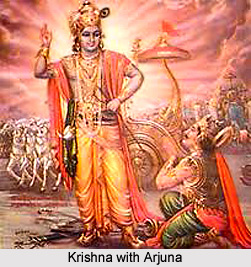 Visit of Lord Krishna to Hastinapur was as an envoy of the Pandavas to persuade Dhritarashtra to restore Indraprastha peacefully to the Pandavas, and thus to avoid war. After the thirteen years` exile was over, the Pandavas once more, by their prowess in battle, revealed themselves to their friends. Dhritarashtra sent an ambassador charged with vague words of peace and friendship to the Pandavas, but he did not convey any definite proposal for giving them back their kingdom and property. After hearing everything from the envoy, all agreed with Yudhishthira that there was only one thing left to be conveyed to the Kauravas. They should be asked to give back Indraprasta or to be ready for a combat.
Visit of Lord Krishna to Hastinapur was as an envoy of the Pandavas to persuade Dhritarashtra to restore Indraprastha peacefully to the Pandavas, and thus to avoid war. After the thirteen years` exile was over, the Pandavas once more, by their prowess in battle, revealed themselves to their friends. Dhritarashtra sent an ambassador charged with vague words of peace and friendship to the Pandavas, but he did not convey any definite proposal for giving them back their kingdom and property. After hearing everything from the envoy, all agreed with Yudhishthira that there was only one thing left to be conveyed to the Kauravas. They should be asked to give back Indraprasta or to be ready for a combat.
The offences of Duryodhana were too many and too persistent. The insults hurled by him during the dice game had been too personal and too offensive. Duryodhana, moreover, had all the opportunity he craved for thirteen years. While his cousins were in exile, he had enjoyed the power of making alliances and dispensing benefits. It was then for him to test the faithfulness and the courage of the friends he had won. The clouds of war hung thick and black above the rival houses, and both knew then that the contest would be to the death. The command of the Kaurava forces were given to Bhishma, while Karna, in order that he might not create a separate faction in the army, opted out of the war till after the grandsire should be slain. The Pandava forces were put under the command of the Panchala prince, Draupadi`s brother, Dhrishtadyumna.
Just before the outbreak of hostilities, Lord Krishna went to Hastinapur to see if it were possible to persuade Dhritarashtra to restore Indraprastha peacefully, and thus to avoid war. Finding his plan becoming not fruitful, and turning to leave the Kuru capital, he had still tried one more device to make the contest impossible. He took Karna aside, and privately told him the secret of his birth, and begged him to announce himself to the whole world as the son of Kunti, and therefore the elder brother of Yudhisthir; not only a prince of blood as proud as the Pandavas` own, but even, if the truth were known, their actual leader and sovereign.
Krishna Meets Karna
Karna listened Krishna with his usual courtesy, not untouched with sadness and told that he knew the fact long ago the nature of his own origin, that Kunti, the mother of the Pandavas, was his mother and the sun his father, and he also knew that it was by the command of the god that she had then abandoned him. However, he could not forget the love and devotion of his adopted parents, the charioteer and his wife. He also told that they had no other child, and that if he gave them up there would be none to make for them the ancestral offerings. He had also married in the caste of the charioteer, and his children and grandchildren were of that rank. Thus he told Krishna that for the mere desire of empire, he cannot cut away these bonds. He was also grateful to his fried Duryodhana who bestowed on him a kingdom for thirteen years without a care. His desire in life had been the right of single combat with Arjuna, and undoubtedly it was the knowledge of this that had made Duryodhana bold to declare war. Thus, he told that if he deserts his friend, then it could be a matter of treachery to his friend.
Karna then told Krishna not to tell the secret of their conversation. They feared if Yudhishthira came to know that Karna was his elder, it was not to be believed that he would consent to retain it. And if the Pandava sovereignty came to the hands of Karna, he himself could do nothing and would then give it over to Duryodhana. It was best, therefore, for all parties that the secret should be as though never told, and that he should act as he would have acted had it remained unknown. Then Karna told Krishna that he knew that truth alone triumphs and that truth would also win the battle at Kurukshetra. However, he was not going for a war, but for a sacrifice for his beloved friend Duryodhana and thus, bade farewell to Krishna and left the place in his own chariot. Krishna returned to the Pandavas after all his attempts failed of stopping the war failed.
Legends of Lord Krishna
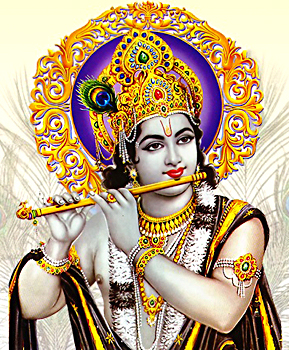 Legends of Krishna in Harivamsa Parva are found in the second section of this Khila of the Mahabharata. It deals almost exclusively with Lord Krishna, the mortal avatar of Lord Vishnu. All the stories of the birth and childhood, the heroic deeds and love adventures of the all-too-human, cowherd-god, are related here at great length. It essentially describes the life of Lord Krishna after the end of the great battle at Kurukshetra.
Legends of Krishna in Harivamsa Parva are found in the second section of this Khila of the Mahabharata. It deals almost exclusively with Lord Krishna, the mortal avatar of Lord Vishnu. All the stories of the birth and childhood, the heroic deeds and love adventures of the all-too-human, cowherd-god, are related here at great length. It essentially describes the life of Lord Krishna after the end of the great battle at Kurukshetra.
In the town of Mathura there reigned the evil king Kansa. To him Narada announced that he would meet his death at the hands of the eighth son of Devaki, the sister of his father and the wife of Vasudeva. Kansa determines to kill all Devaki`s children. He has Devaki closely guarded by his servants, and six of her children are killed immediately after birth. The seventh child is rescued by Nidra the goddess of sleep. She transfers the boy (Balarama) before he is born from the womb of Devaki to that of Mohini, another wife of Vasudeva. The eighth son, Krishna, was exchanged by Vasudeva himself, immediately after birth, in order to rescue him from Kansa, with the daughter of the cowherd Nanda and his wife Yashoda, who was born at the same time. So the little daughter of the latter is dashed against a rock by Kansa, while Krishna is regarded as the son of a cowherd and grows up among the cowherds. Balarama, too, is entrusted to the protection of the cowherd family by Vasudeva, and the two boys grow up together in the cowherds` station.
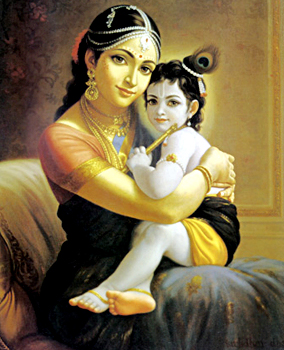 Even as a toddler, Krishna performs wondrous miracles. One day, when his foster-mother Yashoda, after having laid the sleeping child under a wagon, lets him wait too long for food, he begins to struggle impatiently with hands and feet, and finally overthrows the heavy wagon with one foot. The boys Krishna and Rama later rush through forest and field, and make much trouble for the simple cowherd`s wife. On one occasion she hardly knows what to do, so she ties a rope round little Krishna`s body and fastens him tightly to a heavy mortar. But the boy not only drags away the mortar with him, but as the mortar gets caught between two gigantic trees, he tears out the mighty trees by their roots. Horrified, the cowherds and the foster-mother see the boy sitting laughing between the branches of the trees, but he himself is uninjured.
Even as a toddler, Krishna performs wondrous miracles. One day, when his foster-mother Yashoda, after having laid the sleeping child under a wagon, lets him wait too long for food, he begins to struggle impatiently with hands and feet, and finally overthrows the heavy wagon with one foot. The boys Krishna and Rama later rush through forest and field, and make much trouble for the simple cowherd`s wife. On one occasion she hardly knows what to do, so she ties a rope round little Krishna`s body and fastens him tightly to a heavy mortar. But the boy not only drags away the mortar with him, but as the mortar gets caught between two gigantic trees, he tears out the mighty trees by their roots. Horrified, the cowherds and the foster-mother see the boy sitting laughing between the branches of the trees, but he himself is uninjured.
After seven years had elapsed, the boys grew tired of the cowherds` station. So Krishna caused innumerable wolves to issue from his body, which frightened the cowherds so much that they decided to wander further. They wandered with to the Vrinda forest. Here the boys now run happily through the forest. One day, while Krishna was strolling along the banks of the Yamuna River all alone, singing and playing his flute he reached the deep lake in which the snake king Kaliya used to live along with his retinue. He used to poison the water of the river and make the entire neighbourhood safe. Krishna swiftly plunges into the lake, in order to overcome the frightful dragon. Soon the five-headed, fire-breathing monster appears, and a host of snakes rush furiously upon the youthful hero, surrounding and biting him. But he soon frees himself, presses the heads of the monster on the ground and jumps with force on to the middle head so that the dragon confesses himself conquered and retreats with the whole brood of snakes. Soon afterwards he also slays the demon Dhenuka, who, in the form of an ass, guards the mountain Govardhana. Another demon, the giant Pralamba, does not venture to tackle Krishna but is slain by Balarama.
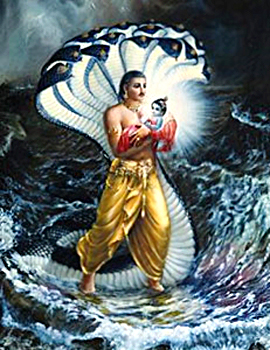 In the autumn the cowherds, according to their custom, wish to hold a great feast in honour of the rain god Indra. However, Krishna wanted none of this celebration of Indra. He told the men that since they were cowherds had to wander through the forest, it was the vows who were their deities. They lived by the wealth of the cows and it was the cows who were their deities along with the hills and forests. In such words he invites the cowherds to hold a mountain-sacrifice instead of the Indra celebration, which the cowherds do. At this Indra is so enraged that he sends down a frightful storm. But Krishna lifts up the mountain Govardhana and holds it like an umbrella over the cowherds and their flocks, so that they are entirely protected. After seven days the storm ceases, Krishna restores the mountain to its place and Indra humbly recognises in Krishna the exalted Lord Vishnu. Then the cowherds praise and worship him as a god, but he smilingly declares that he only desires to be their relative. The time will come later when they will recognise his true nature. And as a cowherd among cowherds he lives in youthful happiness.
In the autumn the cowherds, according to their custom, wish to hold a great feast in honour of the rain god Indra. However, Krishna wanted none of this celebration of Indra. He told the men that since they were cowherds had to wander through the forest, it was the vows who were their deities. They lived by the wealth of the cows and it was the cows who were their deities along with the hills and forests. In such words he invites the cowherds to hold a mountain-sacrifice instead of the Indra celebration, which the cowherds do. At this Indra is so enraged that he sends down a frightful storm. But Krishna lifts up the mountain Govardhana and holds it like an umbrella over the cowherds and their flocks, so that they are entirely protected. After seven days the storm ceases, Krishna restores the mountain to its place and Indra humbly recognises in Krishna the exalted Lord Vishnu. Then the cowherds praise and worship him as a god, but he smilingly declares that he only desires to be their relative. The time will come later when they will recognise his true nature. And as a cowherd among cowherds he lives in youthful happiness.
He organises bull-fights and tournaments with the strongest among the cowherds. On the lovely autumn nights, however, his heart rejoiced in the round dances, which the beautiful cowherdesses, who are all enamoured of the hero-youth, perform in the moonlight, singing of his deeds and jestingly imitating his play, his gait, his dancing and his singing. Once when Krishna was enjoying himself with the cowherds, Arista, a demon in the form of a bullock, appeared. Krishna tears out one of his horns and slays him with it.
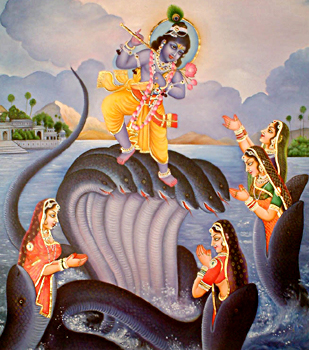 The fame of all the heroic deeds of Krishna reaches the ears of Kansa, and causes him anxiety. In order to get him out of the way, he sends for the two youthful heroes to come to Mathura, where, at a festival, they are to fight with his best wrestlers. But no sooner has he arrived than Krishna performs wonderful miracles and feats of strength. Thus he bends the king`s great bow which even the gods cannot bend with such strength that it breaks into two with a tremendous crash. Krishna pulls out the tusk of an elephant which Kansa lets loose upon the youths, and kills the elephant with it. The two powerful champion wrestlers with whom Kansa confronts the youths are also killed by them. Filled with rage, the king now commands that the cowherd-youths and all cowherds shall be driven out of his kingdom. Then Krishna springs like a lion upon Kansa, drags him by his hair into the centre of the arena and kills him.
The fame of all the heroic deeds of Krishna reaches the ears of Kansa, and causes him anxiety. In order to get him out of the way, he sends for the two youthful heroes to come to Mathura, where, at a festival, they are to fight with his best wrestlers. But no sooner has he arrived than Krishna performs wonderful miracles and feats of strength. Thus he bends the king`s great bow which even the gods cannot bend with such strength that it breaks into two with a tremendous crash. Krishna pulls out the tusk of an elephant which Kansa lets loose upon the youths, and kills the elephant with it. The two powerful champion wrestlers with whom Kansa confronts the youths are also killed by them. Filled with rage, the king now commands that the cowherd-youths and all cowherds shall be driven out of his kingdom. Then Krishna springs like a lion upon Kansa, drags him by his hair into the centre of the arena and kills him.
After some time the two brothers go to Ujjain, in order to learn the art of archery from a famous teacher there. A son of this teacher has perished in the sea, and as his fee, he demands that Krishna shall bring him back this son. Then Krishna descends into the underworld, overcomes the god of death, Lord Yama, and brings the boy back to his father.
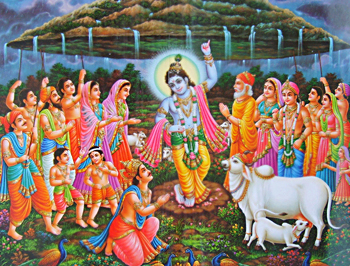 In order to avenge the death of Kansa, his father-in-law Jarasandha goes forth with many allied princes to fight against the Yadavas, besieges Mathura, is repeatedly repulsed by Krishna, but always renews his attacks, until at last he is compelled to retreat. These battles with Jarasandha are described in a long series of narratives.
In order to avenge the death of Kansa, his father-in-law Jarasandha goes forth with many allied princes to fight against the Yadavas, besieges Mathura, is repeatedly repulsed by Krishna, but always renews his attacks, until at last he is compelled to retreat. These battles with Jarasandha are described in a long series of narratives.
The tale of Rukmini is similarly spun out. Bhismaka, King of Vidarbha has promised his daughter Rukmini in marriage to Shishupala and the wedding was about to be celebrated. At this point Krishna comes with his brother Balarama to the marriage-feast and kidnaps the bride. The deeply-offended prince pursues him but is repulsed by Balarama. Rukmin, the brother of the kidnapped girl, swears he will never return to his native town unless he has killed Krishna and brought his sister back. A fierce fight takes place in which Rukmin is defeated but in response to the entreaties of Rukmini Krishna grants him his life. In order not to break his oath, Rukmin founds a new town for himself. In Dwarka the marriage of Krishna with Rukmini takes place. With her he begets ten sons but later marries seven queens and sixteen thousand other wives with whom he begets thousands of sons. Pradyumna, the son of Krishna and Rukmini, later marries a daughter of Rukmin, and their son Aniruddba marries a grand-daughter of Rukmin. At the marriage of Aniruddha, Balarama and Rukmin quarrel over a game of dice and the latter is slain by Balarama. In connection with this there is a glorification of the deeds of Balarama. Then again there is the story of the slaying of Naraka. This Naraka is a demon, who has stolen the ear-rings of Aditi, and also otherwise gives the gods much trouble. At the request of Indra, Krishna fights against him and kills him.
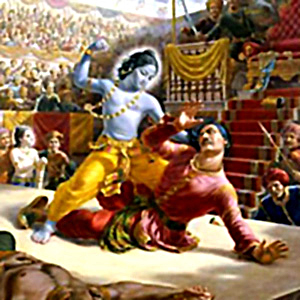 The next narrative in the Harivamsa Parva shows Krishna in a battle against Indra. The seer Narada once brought Krishna a blossom from the heavenly Parijata tree, which Krishna gave to his beloved Rukmini. Then Satyabhama, one of his other wives, grows terribly jealous, and sulks until Krishna promises to bring her the whole Parijata tree from heaven. But as Indra will not willingly surrender the tree, Krishna challenges him to fight. This leads to a long and violent battle between the two gods, which, however, is finally settled peaceably by Aditi, the mother of gods.
The next narrative in the Harivamsa Parva shows Krishna in a battle against Indra. The seer Narada once brought Krishna a blossom from the heavenly Parijata tree, which Krishna gave to his beloved Rukmini. Then Satyabhama, one of his other wives, grows terribly jealous, and sulks until Krishna promises to bring her the whole Parijata tree from heaven. But as Indra will not willingly surrender the tree, Krishna challenges him to fight. This leads to a long and violent battle between the two gods, which, however, is finally settled peaceably by Aditi, the mother of gods.
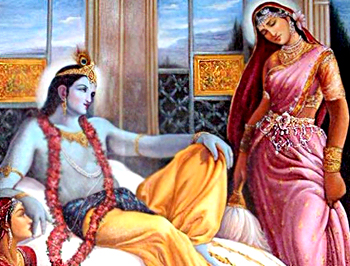 The next section again relates Krishna`s battles with the demons, Asuras, of the "six towns" (Satpwra) steal the daughters of the pious Brahmadatta. Krishna comes to his rescue and kills Nikumbha, the king of the Asuras and restores the Brahmi his daughters. The next section on Krishna relates the story of the killing of the Asura Nikumbha. The Yadavas, with Krishna and Balarama at their head, undertake a pilgrimage to the sea to a sacred bathing-place in order to celebrate a great joyous festival there. Krishna with his sixteen thousand wives, Balarama with his only wife Revati, and youths of the Yadavas with thousands of courtesans give themselves up to playing and singing, feasting and drinking, and all kinds of enjoyments in the water and on the sea-shore. During these festivities the demon Nikumbha kidnaps Bhanumati, the daughter of the Yadava Bhanu. Krishna`s son Pradyumna pursues the Asura and brings the stolen one back while Krishna himself kills Nikumbha.
The next section again relates Krishna`s battles with the demons, Asuras, of the "six towns" (Satpwra) steal the daughters of the pious Brahmadatta. Krishna comes to his rescue and kills Nikumbha, the king of the Asuras and restores the Brahmi his daughters. The next section on Krishna relates the story of the killing of the Asura Nikumbha. The Yadavas, with Krishna and Balarama at their head, undertake a pilgrimage to the sea to a sacred bathing-place in order to celebrate a great joyous festival there. Krishna with his sixteen thousand wives, Balarama with his only wife Revati, and youths of the Yadavas with thousands of courtesans give themselves up to playing and singing, feasting and drinking, and all kinds of enjoyments in the water and on the sea-shore. During these festivities the demon Nikumbha kidnaps Bhanumati, the daughter of the Yadava Bhanu. Krishna`s son Pradyumna pursues the Asura and brings the stolen one back while Krishna himself kills Nikumbha.
After a few shorter pieces, legends and speeches in praise of Krishna, the book concludes with the story of the "battle of Bana" and the love affair of Aniruddha, son of Pradyumna, with Usha, the daughter of the Asura-king Bana. The latter is a favourite of Lord Shiva. Krishna comes to the aid of Aniruddha who is hard pressed by Bana and the fighting with Bana leads to a violent battle between Shiva and Vishnu, by which the whole world is seriously menaced. But Brahma comes to the aid of the earth and creates peace between the two gods by declaring that Shiva and Vishnu are one. Here follows a hymn (stotra) glorifying these two as identical deities. With the marriage of Aniruddha and Usha, which is celebrated with great magnificence in Dvaravati, the book ends.
Teachings of Lord Krishna
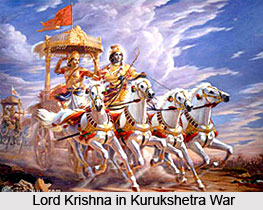 Three great works in Hinduism enumerate Krishna`s Teachings, namely the Bhagavad Gita, Anugita and Udhavagita. Bhagwad Gita is the sacred Book depicting `Mahabharata` for Hindus. The advice Lord Krishna renders to discouraged Arjuna at Kurukshetra, immortalized the Bhagavad Gita, influenced philosophers and continues to inspire millions of people worldwide.
Three great works in Hinduism enumerate Krishna`s Teachings, namely the Bhagavad Gita, Anugita and Udhavagita. Bhagwad Gita is the sacred Book depicting `Mahabharata` for Hindus. The advice Lord Krishna renders to discouraged Arjuna at Kurukshetra, immortalized the Bhagavad Gita, influenced philosophers and continues to inspire millions of people worldwide.
Srimad Bhagavad Gita is the narrations about the relationship between the Supreme Lord and his devotees. In this narration, transcendental nature of the Supreme Lord and his devotees is fully described. Krishna always played the role of a defender of the oppressed. He killed Kansa to unshackle his victims from cruelty. He befriended the poor; the character of Sudama is a legendary character whose berries he ate. He came to rescue of Draupadi. Lord Krishna is also seen as a playmate to cowherds at Vrindavan, a loving and giving soul.
Krishna defined dharma (religion) as something that brought about the good of the individual and society. Krishna`s conversations with Arjun are on transmigration of soul and aims at attaining liberation, descriptions of Karma and effects of austerity. Devotion, meditation and other religious disciplines reflect in Bhagavad Gita. Krishna also touches upon the psychic powers of yogic practices. The love of Gopis is divine which says of the greatness and divinity of Lord Krishna. He is said to create an air of romanticism, enchanted the Gopis and impressed them with the tune of his `bansuri`. Krishna responded by dancing with Gopis in Ras Leela. The mystical passage of Krishna`s life with Gopis and love for Radha is the most marvellous expansion of love expressed in that beautiful play at Vrindavan, which no one can understand yet, become perfectly chaste and pure.
The rustic nature of Lord Krishna is described in some of the Krishna stories, where his music and its effect on the girl cowherds (gopis) are described. It provides a rich source of speculation on its symbolism. It is said that his flute music had a magical power. The peacocks started dancing and other animals stand still and worshipped him with their glances on hearing the flute of Krishna. The celestial maidens flying in their aerial cars above the earth used to get infatuated with him and shower him with flowers, rivers used to turn smooth-running and offer him lotuses, and in the heat of the day clouds used to fall on him their cooling rain on hearing the music.
The Harivamsa of Mahabharata is an appendix to this epic and contains the earliest detailed version, starting from birth of Lord Krishna and leading to his childhood and youth. The scenes from the narrative are set in north India, mostly in the present states of Uttar Pradesh, Bihar, Haryana, Delhi and Gujarat.
Yashoda - Mother of Lord Krishna
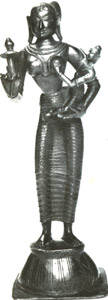 Yashoda was the deity, who brought up Krishna, the son of Devaki and Vasudeva, a mythological king. The image of yashoda illustrates an incident of the birth of Krishna, some aspects.
Yashoda was the deity, who brought up Krishna, the son of Devaki and Vasudeva, a mythological king. The image of yashoda illustrates an incident of the birth of Krishna, some aspects.
According to a mythological story, Vasudeva had several wives, including Devaki and Rohini. After the marriage of Devaki, her brother (Kamsa) had a premonition that her eighth son would kill him. On the request of Vasudeva, Kamsa did not kill Devaki immediately. But, Kamsa proceeded to kill the first six of Devaki`s sons. When Devaki pregnant for the seventh time, Vishnu transferred the embryo to Rohini`s womb to prevent the child to get murdered by Kamsa and it was announced that Devaki had miscarried. When the child was born later, it was called Balarama, where a slightly different story of this incident was given in another text. Afterwards, Vishnu allowed Devaki to conceive him and the Goddess of Sleep and Night was conceived by Yashoda, the wife of the cowherd Nanda. Both Nandaraja and Yashoda used to look after Rohini in their country retreat.
Now, Vishnu was Devaki`s eighth son whom her brother Kamsa is confirmed to kill. But, Lord Vishnu managed the situation in such a way that that Devaki and Yashoda would give birth at the same time and Yashoda would forget the sex of her child. It happened as planned and on the night of the child`s birth, Vasudeva took his son and left him with Yashoda in exchange for her daughter whom he took back to Devaki.
In this way, Vishnu was born as Krishna and was brought up by Nanda and Yashoda in the safety of the country. On the other hand, Vasudeva and Devaki pretended that their eighth child was a daughter. Yashoda brought up Krishna thinking him to be her own child. But later, she became aware of the fact when Krishna became a young boy and had to leave for Mathura to kill Kamsa. But, she still adored Krishna like her own child
Samba, Son of Lord Krishna
Samba is the eldest son of the ten sons of Lord Krishna by his wife Jambavati. Samba is well known for his great strength.
At the Swayamvara of the daughter of Duryodhana, the princess was carried off by Samba. Duryodhana, Kama, Bhishma, Drona, and other celebrated chiefs, incensed at his audacity, pursued him and took him as the prisoner. When the Yadavas heard of the occurrence, they declared war against Duryodhana. But Balarama, uncle of Samba undertook alone to procure the liberation of Samba. Balarama succeeded by threatening to throw the city of Hastinapur into the River.
Later Samba for misleading and ridiculing the Rishis was cursed to bring forth an iron pestle, which was broken and thrown into the sea. A spike of the iron pestle, that could not be broken, was swallowed by a fish. The fish was caught, and the spike was extracted by a hunter named Jara, who tipped his arrow with the spike.
Krishna as Lord Ganesha
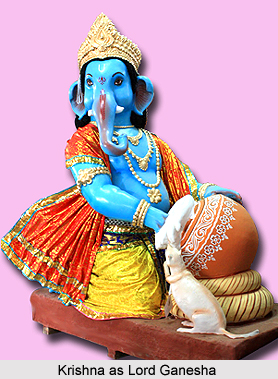 The Brahmavaivarta Purana, one of the eighteen Mahapuranas, mentions that Lord Ganesha is an incarnation of Lord Krishna. The legend states that once Goddess Parvati desired to have a son. Thus her husband Lord Shiva advised to perform a vrata for one year, after which she will gain a son. Parvati performed the Punyaka Vrata the guidance of the holy priest Sanat Kumara. After the end of the vrata, Sanat Kumara demanded dakshina (payment) for performing the ritual. Parvati declared that she would give whatever the priest desired. Then Sanat Kumara demanded Lord Shiva as his payment. Sanat Kumara then demanded her husband, Lord Shiva, as the dakshina. The situation became complicated as Parvati could not give away her husband nor could she refuse the priest. She became extremely upset and unconscious. All the gods, including Lord Vishnu and Lord Brahma advised Parvati to honour her word. Thus she gave away her husband. Later the Goddess offered lakh of cows to Sanat Kumara in return of Shiva. But the priest refused her munificent offer.
The Brahmavaivarta Purana, one of the eighteen Mahapuranas, mentions that Lord Ganesha is an incarnation of Lord Krishna. The legend states that once Goddess Parvati desired to have a son. Thus her husband Lord Shiva advised to perform a vrata for one year, after which she will gain a son. Parvati performed the Punyaka Vrata the guidance of the holy priest Sanat Kumara. After the end of the vrata, Sanat Kumara demanded dakshina (payment) for performing the ritual. Parvati declared that she would give whatever the priest desired. Then Sanat Kumara demanded Lord Shiva as his payment. Sanat Kumara then demanded her husband, Lord Shiva, as the dakshina. The situation became complicated as Parvati could not give away her husband nor could she refuse the priest. She became extremely upset and unconscious. All the gods, including Lord Vishnu and Lord Brahma advised Parvati to honour her word. Thus she gave away her husband. Later the Goddess offered lakh of cows to Sanat Kumara in return of Shiva. But the priest refused her munificent offer.
Goddess Parvati became regretful that even after performing Punyaka Vrata, she could not gain a son and also lost her husband to the priest. Meanwhile all the gods and deities in heaven witnessed an orb of light falling from the sky. Parvati discovered a human figure dressed in yellow garments appearing from the divine orb of light. The divine being announced that He was Lord Krishna. Parvati worshipped Lord Krishna in her grief and wished to have a gorgeous son like Him. Krishna appeared before both Lord Shiva and Parvati and granted them the desired boon.
All the gods persuaded Sanat Kumara to release Shiva from bondage and the Lord returned to His wife Parvati. Later a Brahmana (Brahmin) went to the abode of the divine couple and asked for food. The deprived Brahmana fell at the feet of Parvati and Shiva and praised them. The old person asked for the best of food from Parvati. He declared that the one for whom the Goddess was searching for had arrived. Then immediately he disappeared. The goddess looked all over for him but found a child on the bed in her abode. She picked up the baby in her arms and embraced him. Parvati adopted him as her own son and organized a function. All the gods and goddesses were and invited to admire her son, Lord Ganesha.
Death of Lord Krishna
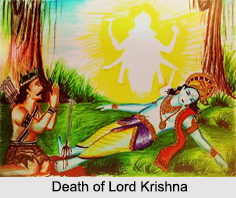 Death of Lord Krishna was destined to be in a desolate situation, by an ordinary man who was a hunter named "Jara". Lord Krishna is considered to be an incarnation or avatar of Lord Vishnu and is widely believed to be the composer of the holy Hindu text, the Bhagavad Gita.
Death of Lord Krishna was destined to be in a desolate situation, by an ordinary man who was a hunter named "Jara". Lord Krishna is considered to be an incarnation or avatar of Lord Vishnu and is widely believed to be the composer of the holy Hindu text, the Bhagavad Gita.
Curse for Death of Lord Krishna
Lord Krishna was deeply involved with the Pandavas during the War of Kurukshetra. He also joined them and aided them in every possible way during the Great War. Lord Krishna was the "Sarathi" or charioteer of Arjuna. Lord Krishna received the curse of Duryodhana"s mother, Gandhari for not rescuing her son. She was an ardent worshipper of Lord Vishnu and recognised Krishna as his incarnation. She equally believed and revered Lord Krishna, but on seeing her son die in front of the Primal Male, she could not find any justification as to why Lord Krishna allowed such things to befall. Soon after cursing Krishna, she realised that she got carried away and feel down on her knees while crying. Krishna lifted her up and smiled. He said to Gandhari that her curse will take effect not only because of her true devotion towards him but due to the fact that change is inevitable and that change is the law of the universe.
Story behind Death of Lord Krishna
Gandhari, the mother of Duryodhana, cursed Lord Krishna that he would perish after 36 years, all alone and in a miserable state. All his followers, devotees, relatives and loved ones would also die simultaneously. Eventually, a time arrived in the life of Lord Krishna; a madness seized the inhabitants of Dwaraka in such an extent that the people started to kill one another. All sons and grandsons of Krishna were also dead in the massacre. Only a woman, Krishna and Balarama were alive in Dwaraka. After a while Balarama desolated himself in a dense forest. Lord Krishna sent the women and children along with a messenger to the city of Kuru and they were left with the Pandavas. Lord Krishna then went to his father, took blessings and left for the forest, where Balarama awaited him. He saw that his elder brother was sitting under a mighty tree on the fringes of the forest. Balarama was sitting in a posture of a Yogi, eventually a thousand-headed snake, "Anant Naga", came out from his mouth and glided its way to the ocean. Soon, the ocean and other holy rivers came together to welcome Ananta Naga into their realm.
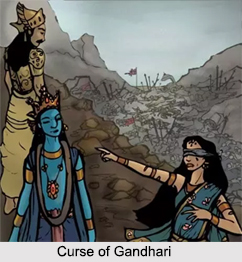 Lord Krishna saw his brother depart from the real world and he started to wander in the forest. Finally he sat on the ground, started to think about Gandhari"s curse, and realised that the time for his departure has already arrived. He self-possessed his senses and concentrated on his Yoga. A hunter named Jara approached that spot of the forest and from a distant saw the partly visible left foot of Krishna and thought to be a deer. He loosed his shaft, took out the arrow, and mistakenly pierced Lord Krishna"s foot. He came hurriedly near the Lord and witnessed him as a man wrapped in yellow robes practicing yoga. The hunter immediately touched the feet of Lord Krishna and asked for apology.
Lord Krishna saw his brother depart from the real world and he started to wander in the forest. Finally he sat on the ground, started to think about Gandhari"s curse, and realised that the time for his departure has already arrived. He self-possessed his senses and concentrated on his Yoga. A hunter named Jara approached that spot of the forest and from a distant saw the partly visible left foot of Krishna and thought to be a deer. He loosed his shaft, took out the arrow, and mistakenly pierced Lord Krishna"s foot. He came hurriedly near the Lord and witnessed him as a man wrapped in yellow robes practicing yoga. The hunter immediately touched the feet of Lord Krishna and asked for apology.
Lord Krishna opened his eyes and comforted the hunter. He informed the hunter about his previous life of Bali who was killed by Lord Rama. He then ascended towards the heaven, thus filling the whole sky with glory. After passing through Lord Indra"s paradise, he reached his place at even higher strata. Arjuna cremated Krishna and the Lord"s wives, including Rukmini, became Sati and were burnt on pyre. The rest of the women of Dwaraka became ascetics and nuns. After each and every living being of Dwaraka moved away to other places, the ocean came about and engulfed the city, thus leaving no trace of the land of Lord Krishna.
Disappearance of Lord Krishna
Lord Krishna"s disappearance marks the end of Dwapara Yuga and the start of Kali Yuga. It is believed that Lord Krishna lived on Earth with brother Balaram for 126 years and 5 months. According to researchers and the scholars, He disappeared on 18th February 3102 BC. The era after his disappearance marks the beginning of Kali Yuga. It is said Lord Krishna had predicted that exactly 7 days after the disappearance of the Lord, the Golden city of Dwarka and the Dwarkanath Temple in Gujarat will drown in the sea. Indeed, Dwarka city is said to have been merged in sea owing to torrential rain. The end of Lord Krishna was destined and yet considered to be another "Leela of the Almighty".




















